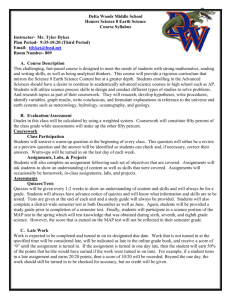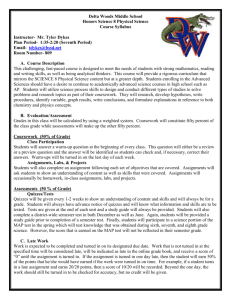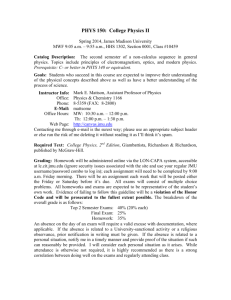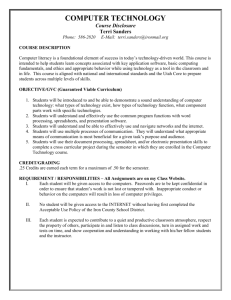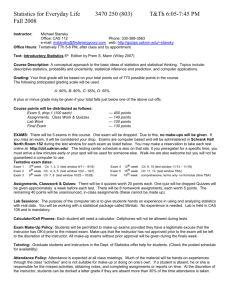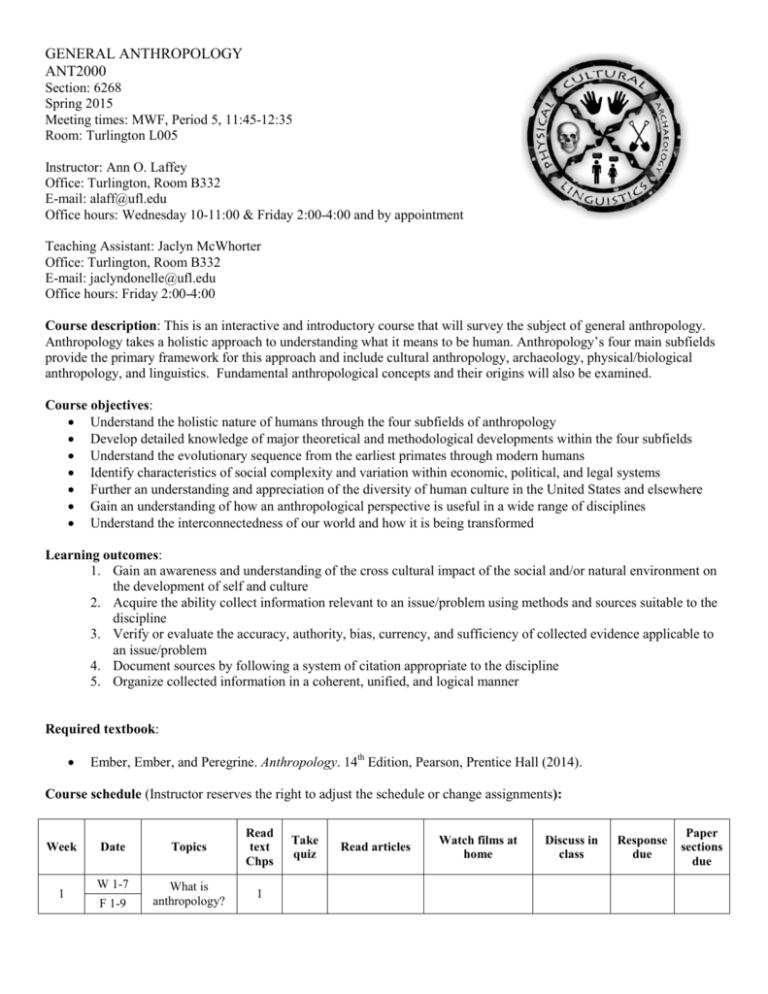
GENERAL ANTHROPOLOGY
ANT2000
Section: 6268
Spring 2015
Meeting times: MWF, Period 5, 11:45-12:35
Room: Turlington L005
Instructor: Ann O. Laffey
Office: Turlington, Room B332
E-mail: alaff@ufl.edu
Office hours: Wednesday 10-11:00 & Friday 2:00-4:00 and by appointment
Teaching Assistant: Jaclyn McWhorter
Office: Turlington, Room B332
E-mail: jaclyndonelle@ufl.edu
Office hours: Friday 2:00-4:00
Course description: This is an interactive and introductory course that will survey the subject of general anthropology.
Anthropology takes a holistic approach to understanding what it means to be human. Anthropology’s four main subfields
provide the primary framework for this approach and include cultural anthropology, archaeology, physical/biological
anthropology, and linguistics. Fundamental anthropological concepts and their origins will also be examined.
Course objectives:
Understand the holistic nature of humans through the four subfields of anthropology
Develop detailed knowledge of major theoretical and methodological developments within the four subfields
Understand the evolutionary sequence from the earliest primates through modern humans
Identify characteristics of social complexity and variation within economic, political, and legal systems
Further an understanding and appreciation of the diversity of human culture in the United States and elsewhere
Gain an understanding of how an anthropological perspective is useful in a wide range of disciplines
Understand the interconnectedness of our world and how it is being transformed
Learning outcomes:
1. Gain an awareness and understanding of the cross cultural impact of the social and/or natural environment on
the development of self and culture
2. Acquire the ability collect information relevant to an issue/problem using methods and sources suitable to the
discipline
3. Verify or evaluate the accuracy, authority, bias, currency, and sufficiency of collected evidence applicable to
an issue/problem
4. Document sources by following a system of citation appropriate to the discipline
5. Organize collected information in a coherent, unified, and logical manner
Required textbook:
Ember, Ember, and Peregrine. Anthropology. 14th Edition, Pearson, Prentice Hall (2014).
Course schedule (Instructor reserves the right to adjust the schedule or change assignments):
Week
1
Date
Topics
Read
text
Chps
W 1-7
What is
anthropology?
1
F 1-9
Take
quiz
Read articles
Watch films at
home
Discuss in
class
Response
due
Paper
sections
due
M 1- 12
2
W 1-14
F 1-16
Anthropological
research
methods
2
Genetics &
evolution
3
1
Shipman 2003
link
M 1- 19
3
W 1-21
F 1-23
M 1-26
4
W 1-28
NO CLASS
Primates
5
Homonins
6
Emergence of
Homo
7
F 1-30
M 2-2
5
W 2-4
F 2-6
Ape Genius
1
Cartmill 2000
PDF
Topic
Wong 2006 link
8
Migration &
sedentism
Food
acquisition
M 2-9
9
Subsistence
10
15
2
2
Mauss 1990
PDF
16
Sources
EXAM I
6
Civilization
11
Brunton 1970
PDF
M 2-16
Culture change
8
W 2-25
3
Nanook of the
North
12
F 2-20
M 2-23
Indus: The
Unvoiced
Civilization
Gumerman
1997 PDF
F 2-13
W 2-18
1
2
W 2-11
7
Decoding
Neanderthals
3
Agency
Society
F 2-27
3
13
Marks 1994
PDF
4
A Question of
Race
17
Outline
SPRING BREAK: 2-28 to 3-8
M 3-9
9
W 3-11
Linguistics
14
F 3-13
M 3-16
Sex & Gender
18
4
10
W 3-18
F 3-20
Marriage
19
Kinship
20
4
Yu 2014 PDF
1. Friedl 1978
PDF, 2.
Williams 2010link, 3.
WebMD-link
4
Becoming Maasai
Women
Naranda 1998
PDF
5
M 3-23
11
W 3-25
F 3-27
5
EXAM II
2
M 3-30
12
Religion
Les Maîtres Fous
W 4-1
F 4-3
6
Art
W 4-8
5
Interest groups
21
Social order
22
W 4-15
Human health
26
F 4-17
Globalization
27
M 4-20
Applied
anthropology
25
F 4-10
Layton 2003
PDF
24
M 4-6
13
Gmelch 1992
PDF
23
6
M 4-13
14
15
W 4-22
Messer 2000
PDF
Paper
due
6
EXAM III
Online reading assignment links: Follow the link, you can read online and take notes or download
Shipman, Pat (2003) We are all Africans. American Scientist, Past Issue:
http://www.americanscientist.org/issues/pub/we-are-all-africans
Wong, Kate (2006) The Littlest Human. American Scientist 16, 48 –
57: http://www.nature.com/scientificamerican/journal/v16/n2/full/scientificamerican0606-48sp.html
National Geographic, Genographic Project, “Why Am I Denisovan?”:
https://genographic.nationalgeographic.com/denisovan/
WebMD, “Gender Identity Disorder”: http://www.webmd.com/sex/gender-identity-disorder
Williams, Walter. The Two-Spirit People of the Indigenous Americas, The Guardian:
http://www.theguardian.com/music/2010/oct/11/two-spirit-people-north-america
PBS, “Race: The Power of Illusion”: http://www.pbs.org/race/002_SortingPeople/002_00-home.htm
Film links: all of these films are available online and will be watched at home, NOT in class
Nova, PBS, “Ape Genius”: http://www.pbs.org/wgbh/nova/nature/ape-genius.html
Nova, PBS, “Decoding Neanderthals”: http://www.pbs.org/wgbh/nova/evolution/decoding-neanderthals.html
Flaherty, Robert J. (1922) “Nanook of the North”: https://www.youtube.com/watch?v=m4kOIzMqso0
McRae, Stuart (1993) Subsistence base Anthropology: https://www.youtube.com/watch?v=TKlPdleRGwg
www.Askenya.org. “Becoming Maasai Women”: https://www.youtube.com/watch?v=G5w3PEHsnr8
MICO: “Indus: The Unvoiced Civilization”: http://digital.films.com/play/LJLKRS
Les Maîtres Fous (1955) – English subtitles: https://www.youtube.com/watch?v=ZIi1BTK-c-0
Assigned article PDFs available through canvas: you will find the reading under the course heading of ANT2000, and
then click on “files”, all PDFs will be there available for download. This is the canvas link: https://lss.at.ufl.edu/
Brunton, Ron
1970 Why do the Trobriands Have Chiefs? Man, New Series 10 (4): 544-558.
Cartmill, Matt
1989 The Gift of Gab. Discovery 19 (11): 56-60.
3
Friedl, Ernestine
1978 Society and Sex Roles. Human Nature 1:149-158.
Gmelch, George J.
2000 Baseball Magic: Revised version of "Superstition and Ritual in American Baseball." Elysian Fields
Quarterly 11 (3): 25-36.
Gumerman, George IV.
1997 Food and Complex Societies. Journal of Archaeological Method and Theory 4 (2): 105-140.
Layton, Robert
2003 Art and Agency: A Reassessment. Royal Anthropological Institute 9: 447-464.
Marks, Jonathan
1994 Black, White, Other: Racial Categories are Cultural Constructs Masquerading as Biology. Natural History
Magazine Pp. 33-35.
Mauss, Marcel
1990 The Gift: The Form and Reason for Exchange in Archaic Societies. Translated by: W.D. Halls. W.W.
Norton, New York.
Messer, Ellen
2012 II.B.3 - Potatoes (White), Part. In: The Cambridge World History of Food. Cambridge University Press,
U.K.
http://dx.doi.org/10.1017/CHOL9780521402149.023
Nanda, Serena
2000 Arranging a Marriage in India. In: Stumbling Toward Truth: Anthropologists at Work, edited by Philip R.
Devita, ed. Pp. 196–204. John Jay College of Criminal Justice.
Yu, Alan
2014 How Language Seems To Shape One's View Of The World. Shots - Health News: NPR: 1-4.
Student expectations: Students are required to attend lectures and to complete all assigned readings before class. Open
discussion of the readings will follow a brief review and lecture, and students are expected to actively participate in these
discussions. Grades will be based on a combination of class participation, written assignments, quizzes and exams.
Exams: There are a total of three exams that will be given in class and will consist of multiple choice questions as well as
short answer questions. Exams will cover lecture material, films, material from your assigned readings in your text as well
as the supplemental material posted in canvas. There will be NO make-up exams unless discussed and arranged with the
instructor prior to the scheduled date of the quiz. Make-up exams are essay format.
Quizzes: There will be a total of six quizzes. The will cover ALL assigned materials. They will be given at the beginning
of class. Quiz questions will often appear on exams. If you are late, you will NOT be permitted to make the quiz up. There
will be NO make-up quizzes unless discussed and arranged with the instructor prior to the scheduled date of the quiz.
Class discussions: There are a total of six formal, scheduled class discussions. Students are expected to come prepared
having read and viewed ALL assigned materials, including films. You will be working in teams that will be assigned in
class. You will be expected to come to class with a MINIMUM of three discussion questions accompanied by the
answers/opinions for each question (you can have more if you wish). You should have at least one question for each film
or article, the rest can be devoted to the textbook. Questions and answers need to be typed. Save a copy of your document
so you can reference it later. Your three questions and answers will be turned in on “Discussion days.” Your team leader
will assemble all of your group’s questions and select three of the group’s questions for further group discussion. I will
collect the entire class’s questions with the three selected questions circled. Three important things will happen with these
questions:
First, after referencing these questions I will formulate the questions for your response papers that will be due two
class periods later.
Secondly, three of your questions will form the first section of your response paper. Concepts discussed on
“discussion days” should appear in response papers.
Lastly, I will select exam questions from the questions submitted by the class.
4
Response papers/Activities: There are a total of four response/activity papers. Each of the response papers will require
that you address discussion questions that have been submitted during discussion days. Some of these responses may take
the form of activities that compliment that week’s topic. I will assign each response paper or activity IN CLASS. I will
give detailed instructions. In general these response papers should not be more than two double-spaced pages. If you are
not in class that day you will not be eligible to turn in the assignment unless PRIOR arrangements are made. Response
papers will be submitted to Canvas on the due date PRIOR to class under the “assignments” section.
Semester paper: The paper is divided into four separate assignments:
Topic/thesis: The student is required to get the topic approved with the instructor. No two topics can be the same;
the first student to get the topic approved will get that assignment. A master-list of topics will be posted in canvas.
Sources: Students are expected to have at least three academic, peer reviewed articles or books based on their
topic of interest. Online sources must be cited and approved by the instructor.
Outline or draft: the student can submit an outline or a draft. Drafts are strongly encouraged as the instructor will
provide feedback if drafts are submitted.
Final paper:
o The final paper should be NO longer than 7-8 double-spaced pages
o No spaces between paragraphs, the first line of paragraphs should be indented
o No extra or double-space in between sentences
o The font should be Times New Roman size 12
o The margins should be standard Microsoft default (1” X 1”)
o DO NOT include a cover page or photographs.
o Number the pages
o You MUST have a referenced cited page or bibliography (This does not count as part of the 7-8 page
limit)
o You should have in-text citations. For example: “I do not like green eggs and ham, Sam I am (Seuss
1960: 2).”
o You can use any format, however, for anthropological writing AAA format is recommended, the guide
will be posted in canvas.
o The front page of your paper should be formatted in the following way, with single spacing, in this order:
Paper title (centered), next line: course title and course number (together), next line: semester
(Ex: Fall 2014), next line: Instructor’s name, next line: your name. The body of your paper can
begin after you double-space (Align text to left).
o Staple the pages together in the proper order
o You must submit a word doc to TURNITIN.COM. I will give you instructions in class
o If these instructions are not followed points will be deducted. If you any questions about the paper you are
strongly encouraged to ask the instructor.
Final grades are assigned out of 450 points, based. A detailed breakdown of final grades is as follows: Additional
information on UF grading policy can be found at: https://catalog.ufl.edu/ugrad/current/regulations/info/grades.aspx
Assessments: A student can earn a maximum of 450 points.
Three exams (50 points each) = 150 points
Quizzes, six total (5 points each) = 30 points
Responses, six total (20 points each) = 120 points
Semester paper, four parts (20, 20, 20, 90) = 150 points
Letter
grade
A
Total
points
400- 371.9- 359.1- 347.9- 335.9- 319.9- 307.9- 295.9- 279.9- 267.9- 255.9- 239.9372 360
348
336
320
308
296
280
268
256
240
0
A-
B+
B
B-
C+
C
C-
D+
D
D-
E
5
Percent 100- 92.993
90
89.987.0
86.984.0
83.980.0
79.977.0
76.974.0
73.970.0
69.967.0
66.964.0
63.960.0
<60
Critical Dates: MARK THESE DATES IN YOUR CALENDAR
Paper topic due: January 26
Paper sources: February 9
Paper outline: February 27
Exam I: February 11
Exam II: March 27th
Paper Due: April 10
Final Exam (EXAM III): April 22
Class Attendance and Tardiness Policy:
No class roll will be taken; however, absence from class will directly affect your participation grade in this class.
Absence from class will make you ineligible for participation credits that session. You are expected to be in class from
beginning to end. Arriving late for class or leaving early has the same effect as absence from class. It will make you
ineligible for participation credit that session. Any student who misses more than three classes must communicate to the
instructor the reasons for these absences. If for any reason you stop attending class, without notifying your instructor, you
will receive an “E” grade on your permanent record. Requirements for class attendance and make-up exams, assignments,
and other work are consistent with university policies that can be found at:
https://catalog.ufl.edu/ugrad/current/regulations/info/attendance.aspx
Late Assignment Policy: Assignments that are turned in late receive no credit or will not be evaluated unless there has
been a documented emergency. Similarly, missing an exam deadline will result in a failing grade for that exam unless
there has been a documented emergency. Documented emergencies include emergency (not routine) hospitalizations of
the student (certified by attending physician), deaths in the immediate family or love (parents, siblings, spouses, children,
or a lover; certified by a mortician), or disabling accidents/diseases involving the student near the time of the due date
(certified by police). No more than one such exception will be made.
Academic honesty: As a result of completing the registration form at the University of
Florida, every student has signed the following statement: “I understand that the
University of Florida expects its students to be honest in all their academic work. I agree to adhere to this commitment to
academic honesty and understand that my failure to comply with this commitment may result in disciplinary action up to
and including expulsion from the University.” An excellent website that discusses plagiarism (provides a definition and
many useful examples) is
http://www.csubak.edu/ssric/Modules/Other/plagiarism.htm. All students should read this material.
Accommodations for students with disabilities: If you require accommodation due to a disability, please make an
appointment during my office hours so that we may discuss your needs. Students requesting classroom accommodation
must first register with the Dean of Students Office. The Dean of Students Office will provide documentation to the
student who must then provide this documentation to the Instructor when requesting accommodation.
Tutoring: Tutoring is available through the teaching center: SW Broward Hall, 3922010. Reading and writing assistance is available through the Reading and Writing Center: SW Broward Hall, 392-6420. I
highly recommend you visit the Reading and Writing Center at least once this semester.
If for any reason you are overwhelmed, over-stressed, experience prolonged periods of sadness, or simply need
assistance with time management or study skills please utilize UF’s Counseling Services:
On-campus services are available for students having personal problems or lacking clear career and academic goals. They
include:
1. University Counseling Center, 301 Peabody Hall, 392-1575, personal and career counseling
6
2. Student Mental Health, Student Health Care Center, 392-1171, personal counseling
3. Sexual Assault Recovery Services (SARS), Student Health Care Center, 392-1161, sexual assault counseling
4. Career Resource Center, Reitz Union, 392-1601, career development assistance and counseling
Harassment and Discrimination:
“Harassment” is defined as conduct that (1) is of any type (written, oral, graphic, or physical) (2) is directed towards or
against a person because of their personal status (i.e. race, religion, sex, sexual orientation, political affiliation, national
origin, age, disability, marital status, pregnancy or others) and that (3) unreasonably interferes with the individual’s work,
education, or participation in activities or programs at UF or creates a working or learning environment that a reasonable
person would find threatening. “Discrimination” is defined as a conduct that (1) adversely affects any aspect of an
individual’s employment, education, or participation in activities or programs at UF, and (2) is based on one or more
personal characteristics listed above. Any student who feels their rights have been violated is asked to confront the
offending party, should that not resolve the issue, or the student is uncomfortable with confronting the offending party
they may file a complaint with UF Department of Human Resources.
Cell phones, computers, touch pads and other smart devices: College students are adults and capable of making
informed decisions. Use of cell phones, computers and touch pads will not be actively policed. However, students are
asked to please be respectful their fellow students in the course as well as the instructor, who will not appreciate continued
distractions.
Course evaluations: Students are expected to provide feedback on the quality of instruction in this course by completing
online evaluations at https://evaluations.ufl.edu. Evaluations are typically open during the last two or three weeks of the
semester, but students will be given specific times when they are open. Summary results of these assessments are
available to students at https://evaluations.ufl.edu/results/
Frequently asked questions or FAQs:
Do you post your powerpoints? Yes, powerpoints for each upcoming class will be posted prior to class in canvas.
How soon can I expect a response from an e-mail? And where should I e-mail? I try and answer all e-mails within a 24
hour period. This means that if you e-mail me at 3 o’clock in the morning you may not get an answer until the following
day. Please use the UF e-mail address.
How do I do well on the quizzes? Quizzes are primarily designed to reward students who attend class. If you read assigned
materials and attend class regularly you will do well.
How do I get the maximum points for response papers? To get the maximum points on responses be sure to address
questions completely. If you are asked an opinion question, it should include SPECIFIC references to readings, films,
assigned articles, or lecture to support your opinion. Be sure to complete all sections of activities.
Will you post a study guide for the exam? No, I will not post a study guide. All assigned materials including films, articles,
and ideas presented in class will be fair game for the exam. However, there are a few helpful hints:
You will find a list of key words and concepts at the end of each posted powerpoint, be sure that you know these
before you take the exam.
I will take at least two to three questions directly from your book. You can find these questions at the end of each
chapter, they appear after the large “?” icon. Therefore, it is a good idea to go ahead and answer those questions in
your notes as you read.
I also take many questions directly from the quizzes given in class so it is a good idea to make sure those are in
your notes.
You will most certainly see some of the response questions in some format on the exam.
How do I make a good grade on my semester paper? Follow all of the instructions provided in the syllabus regarding
format and look for feedback from the paper assignments throughout the semester.
7
I have never been required to do “in-text” citations, provide peer reviewed references, or format a paper in a particular
style, what do I do? USE YOUR LIBRARY. Here the library is your best friend. Did you know that your librarian is
trained to help you with all of these things?? Follow this link; it will provide you with all the information you need
including contact information, hours, and locations: http://uflib.ufl.edu/service.html
This link will get to a live librarian that can assist you http://www.uflib.ufl.edu/ask/
If I am concerned about how an assignment is graded can I ask the instructor to review? Absolutely, I strongly encourage
all students to approach me, in a respectful manner, to discuss any grades or concepts they are concerned about. However,
you must bring any concerns to my attention in a timely manner, within 24-48 hours of receiving the graded assignment.
Grades for assignments that have been returned to you over a week prior can be discussed, but will NOT be considered for
grade changes. This means you cannot wait until the end of the semester to discuss grades on assignments.
Is there any extra credit? Extra-credit is at the discretion of the instructor. However, it is unlikely that extra-credit will be
offered. If extra credit is assigned it is offered to all students. There will be absolutely NO extra-credit awarded to
individual students.
What if my computer is stolen or crashes right before a response or semester paper is due? Students are strongly
encouraged to keep a copy of all paper drafts on a flash-drive, send a copy to a drop-box account, or simply e-mail drafts
to their own e-mail address. Computers are available for students to use in the library or you can borrow one from a friend
or family member. Therefore, you will be expected to turn in your paper on time even if such tragedies occur.
8



